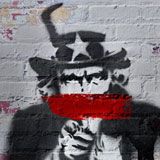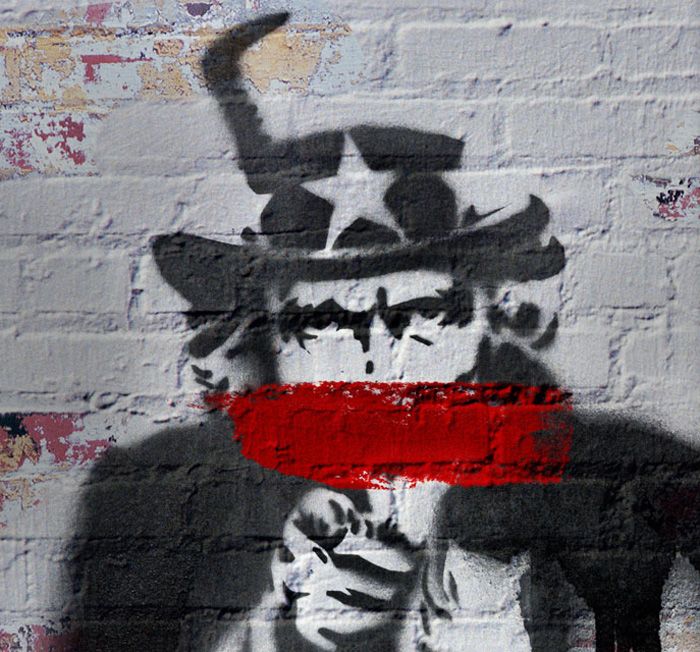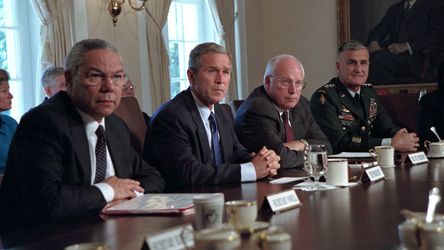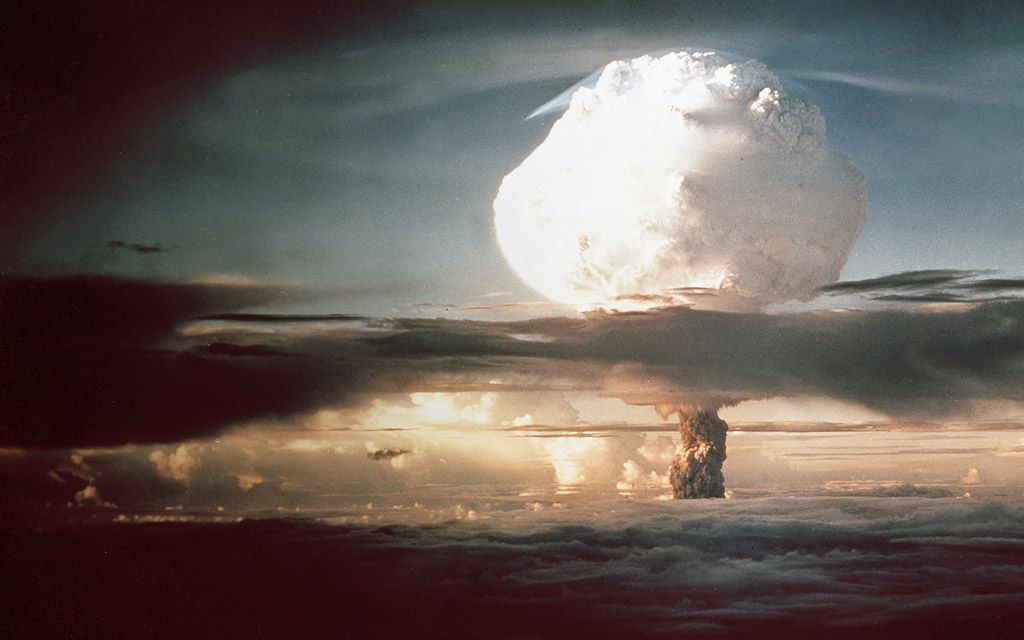For better or worse, filmmaker Oliver Stone has always attracted controversy. Thanks in no small part to his willingness to look closer at political figures like John F. Kennedy and George W. Bush, he’s become a lightning rod for discussion, prompting audiences eager for entertainment to question his work, and in the process, the world around them. And in the Showtime documentary series The Untold History of the United States, he challenges conventional wisdom on a grand scale, going back to the days before World War II to dig through tons and tons of research to pull back the curtain on a few myths, while possibly creating new ones.
Spinoff Online joined a small group of reporters in Los Angeles to speak with Stone about Untold History, which debuted this week on Blu-ray. In addition to explaining his approach to this warts-and-all portrait of American history, Stone discussed the larger implications of questioning our past, and offered a few thoughts about the media and the world today, including opinions about Batman, Transformers and, of all things, the Breaking Bad finale.
In Untold History, you use footage from fiction films to comment on and illuminate the ideas. How did you decide to use that footage?
Oliver Stone: When you look at long swatches of archive film – I've been through hundreds of hours of that – you can really fall asleep. It's how do you make this less boring? I mean, I love history, but I know that the moment [people] see black and white, sometimes they drift. I've had that experience. So I wanted to make it exciting, and the narrative had to constantly be rewritten. The movie idea came naturally because we're talking about the culture, about the perception of things throughout the series. So why not use movies? I would have used more, but with 58 minutes and 30 seconds in every chapter, you do have a very tight limit. Also, fair use, you can't use more than approximately a minute, maybe less from the studios. They won't give you permission. So we were always toeing that line, but I think it relieves the sameness of it, the narrative, the voice. We had no interviews. I hate interviews because they really would have killed this. So we went with that, and basically, I would have put more films in. And I did put some outrageous examples, but people said, 'That's too much.' We always had our own sounding board.
The Capra stuff and the Stallone stuff was terrific.
Stallone, you have to put him in because he is such a force in the 1980s. It controlled public perception that Afghanistan was the evil Soviet empire. In Vietnam, we had to go back and get the POWs. It's so important. Film just reaches out and it hits so many people in the guts. It becomes emotional in America. Also, don't forget how the importance to George Bush of Pearl Harbor and Black Hawk Down. Black Hawk Down had a huge impact, as did Saving Private Ryan. Huge impact on the culture in the ‘90s, at a time when we didn't have that enemy any more, the Soviet Union. So these films kind of filled a need. And I was there, and I remember making movies. [And] you start to see that surge back to the World War II generation where George Bush, the father, the fighter pilot hero, and here we go again. And they sold the greatest generation, Ambrose, who was a right-wing conservative, Stephen Ambrose and Tom Brokaw. And I do think that's set up a climate for Black Hawk Down to be nominated, which is a wonderfully made film, but such an ill, such a horrible message to give. That U.S. technology is, gee whiz, U.S. thunder and shock and awe. That's what Bush quoted. He loved that concept of awe. We'll awe them. We'll blow them away with our technology. That's what I object to. One of the reasons I made the series is to get these movies in.
How careful did you have to be juxtaposing what was actual period footage of people being shot with fictional footage?
We would put reenactment if there was a visual reenactment. There are some reenactments of the Philippine war. You have 12 hours, right? I don't know if you've seen them all, but the Filipino war footage is amazing, of the 1900. But wherever there was a reenactment, we would put that in. But you'll see plenty of killing in there, but I don't think we did it in bad taste. I don't remember a piece of film coming up at the wrong time.
I just was wondering if there was a particular ethos to make sure that people weren't looking at actual footage and mistaking it for fiction or reenactments.
I skirted that border on JFK several times, but that's a question of editing choice. I would have to deal with that on a specific basis. What I should have done, probably – it would have been difficult – but the audio. I mean, we have a lot of real voices, but sometimes we did slip into the actor. We had actors doing some of the voices, but they were doing them very close to the spirit – we thought – of the actors. So every time, I could have said, 'reenacted voice.' I thought about that when I was listening to it the other day, but you can't do everything. We did as much as we could.
What did you feel you weren’t able to do in your dramatic films that documentaries gave you the opportunity to explore?
Well, in 2008 I had done 17 films, I think, at that time, and I said, look, we’ve been through eight years of George Bush. Whatever your feelings about George Bush, for me it was a nightmare, a personal nightmare as a veteran of the Vietnam War, that we were repeating everything that we had done wrong, and we’re not seeing it. And I thought, we’ve got to do something more for my children. If I make another feature film, it might be a big hit, but it’s not going to give me the same satisfaction. I’d like to be honest to my time, and I lived from 1946 to now, and I want to understand why our country, which I love so much, and was a great country when I was young, it seemed, became this monster vampire on the face of humanity – a vampire squid, to quote Matt Taibbi, sucking out the juices of all mankind. Why? It’s a basic question. And if you live at a certain time in a certain period, you’ve got to ask those questions. Otherwise you’re not really being honest to your time. And I had the ability to do it, I could get the financing, I had the backing and the trust of enough people to get this done. And I also got it on the air, which is a miracle in this country, because it would never be on the air on commercial television – there’s no way. Our commercial television is so limited in what it’s allowed to show because of the controversial aspect. They don’t want controversy – that doesn’t sell product. So we were able to get it out there with Showtime, and that was a miracle, believe me, it was a miracle. I don’t think it would have been on the air anywhere, unless it had been a major filmmaker.
What does making a documentary give you personally as an artist?
Documentaries refresh you. You go back to the source. You go out into the field, you actually do a lot of research. In some cases, with the other documentaries, you meet people on the road and make road movies. They give you a transfusion, because living in a studio world, living in a world of manufacturing resolutions, manufacturing what people feel good [about], only thinking about what makes the audience moved, and looking at preview cards, it’s okay. But it’s got its limitations after a while, so you try to get back to the bottom, the basic truths about life. There’s too many war movies being made, too much violence in our movies – and it’s all unreal to me. I don’t know if you saw, for example, Breaking Bad, but they’re all raving about Breaking Bad. I don’t know if you saw the denouement, I happen to not watch the series very much, but I happened to tune in and I saw the most ridiculous 15 minutes of a movie – it would be laughed off the screen. Nobody could park his car right then and there and could have a machine gun that could go off perfectly and kill all of the bad guys. It would be a joke. It’s only in the movies that you find this kind of fantasy violence. And that’s infected the American culture; you young people, the film school rejects, believe all of this shit! Batman and Superman, you’ve lost your minds, and you don’t even know it! At least respect violence. I’m not saying don’t show violence, but show it with authenticity. Who’s the film school rejects? That’s you!
Talk a bit about what the research process was for something this massive.
Well, Peter’s [Kuznick, Stone’s co-writer on the series] been teaching American history since the 1970s. He studied with the revisionists who wrote these kind of [pieces] criticizing U.S. foreign policy in World War II and post-World War II. William Appleman Williams, from the University of Wisconsin, was very influential. Leffler, Lloyd Gardner, the fellow who wrote the atomic bomb, Gar Alperovitz. These are the revisionist historians who came into being the anti-Arthur Schlesinger types, that inhabit universities and are read in universities. So it was very important you get that balanced history of the Cold War – who Truman really was. David McCulloch is a popular historian, he got the Pulitzer Prize, and we think he really mischaracterized Truman and mischaracterized the situation, so we attacked him. And the book goes into more depth on this issue of who Truman really was, but this is a key issue as to what happened after World War II. And we give it a pass, we give the atomic bomb a pass, and we really object to that because it’s important to understand why we dropped the atomic bomb, and what it’s done to our thinking since then. It’s corrupted it.
There are two prologue chapters. Why didn’t they air?
They’re really good chapters, I’m really proud of them, essentially they’re very complex chapters and they involve WWI empire and Russian revolution and the causes of WWII. In those two chapters there are a lot of different names, alliances, we thought that for the teenager, the college audience in America to start with WWII because at least it was recognizable names, that we would do better, Truman, Eisenhower, Roosevelt. If you start with WWI you start with Wilson, McKinley, the Russian Revolution, it’s a little off-putting. We made the decision to make it simpler for the American audience, probably it was not a great decision but television, would anyone have watched the first two chapters and come back for the third chapter I wonder. It was more of a bang start, that’s my decision creatively.
Did you find stories in the course of this that you would like to dramatize in a fiction film?
Oh, there’s great stories.
The one about the political officer on the Soviet submarine.
Oh, yeah, Arkhipov. That’s a movie, yeah. I love those movies. That’s an important movie. It’s a great movie, yeah. Yeah, I think you can make -- Henry Wallace is a great Gary Cooper character. John Kennedy is a great character. Yes. I did a movie on Bush, come on, give me credit. I did movies on Nixon and Bush. These are two of the most, for me, despicable -- detestable men, not despicable -- detestable men. They really hurt our country. And I made movies about them from that point of view. So I’ve made a huge effort to go to the other side to understand.
In the closing of Untold History you talk about a woman that you met in the 1970’s and her telling you to feminize the planet and you closed it with love. How did that come about?
I don’t want to trivialize it, but yes. I know a young woman now who’s worked on MoveOn, not this woman, but her new documentary is about testosterone. And she says that testosterone is ruining this planet, [laughs] and I’m curious to see it. But there is an argument to be made that testosterone has to be modulated. It’s just when men get this- and women too, I include Hillary Clinton. I have to. I have to include Madeline Albright. And I include -- I mean, women have proven hawks -- Golda Meir, Gandhi in India, I mean the woman leader, they’ve been very, very hawkish. So let’s not separate that. But the concept of going head to head and fighting something out has got to be re-examined. It doesn’t work through time. Negotiation, peace keeping is the highest value of all. Those heroes like Henry Wallace, Martin King, John Kennedy, Franklin Roosevelt, those are the peacekeepers. We need them. Carter tried and Clinton briefly tried. Obama, I think, tried. But I think we need these people in our system and our system defeats them time and time again because money is made by creating conflict and strife.
The movie and the book both kind of end on a question mark as far as Obama is concerned. Do you think there’s hope that he will?
I hope so. It says in the series that “history has taught us that the curve of the ball … is something that we never know.” I forgot exactly the quote, but it’s a beautiful quote. It’s in the series, not the book and I really believe that. We didn’t know about the fall of the Soviet Union. We didn’t see it coming. I was shocked. We all were. It was a beautiful moment and we had a moment of peace, of potential peace. We didn’t see 2001. We had hopes for Obama, for reform. Henry Wallace we had tremendous hopes for. There are all these moments in history. If Kennedy hadn’t been assassinated in Dealey Plaza he would have won that election. That was a huge deal, a huge deal because that second term would have freed him up in a way. All these things can change, so we don’t know. And when you think an empire is going to control everything and is going to go a certain way that’s exactly the moment when it doesn’t go that way. Maybe this government shut down, it might be the curve of that ball that no one foresaw. You know? Stay open. Things don’t always turn out the way you think they’re going to turn out. That gives me hope, by the way. That’s why I’m not cynical and despairing, as you asked me. It’s very hard not to be sometimes.




